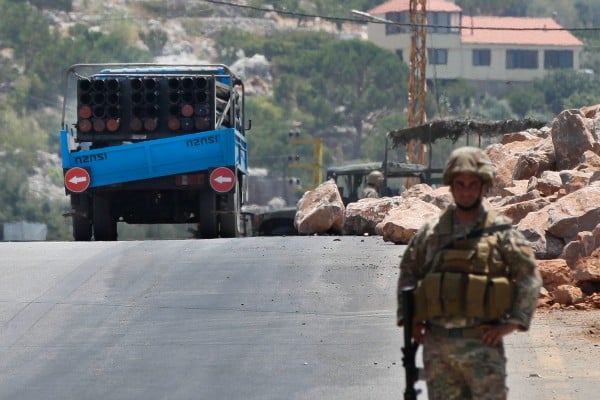Angry Druze villagers seized a Hezbollah launcher and the Maronite Patriarch speaks out against the terror group’s stranglehold.
By Pesach Benson, United With Israel
Lebanese civilians are increasingly fed up with Hezbollah storing and launching rockets around their homes, school, hospitals and mosques.
On Friday, Hezbollah fired 19 rockets at Israel — the first time since the Second War in Lebanon in 2006. The launch came in the wake of an unidentified terror group in Lebanon firing rockets at Israel two days prior, which was followed by Israeli artillery and air strikes.
Druze residents of the southern Lebanese of Chouya drew widespread attention on Friday when they surrounded a pickup truck carrying the rocket launchers used in the barrage. Video footage showed the angry residents harassing the Hezbollah operatives in a blue flat back truck.
In the video, furious villagers can be heard yelling, “Hezbollah is firing rockets from between homes so that Israel hits us back.”
Eventually, the Lebanese Armed Forces showed up, arrested the four Hezbollah men and confiscated the rockets.
Presumably, Hezbollah quietly secured the release of its four men. The fate of the launchers is anybody’s guess.
Forced into damage control, Hezbollah announced in a statement that the rockets had been fired from isolated locations away from civilians.
“The Islamic Resistance was and will always be most keen about the safety of its people and avoiding any harm to them through its acts of resistance,” the statement said. Ordinarily, that would have ended the story.
The Maronite Patriarch speaks out
On Sunday, Lebanon’s Maronite Patriarch Bechara Boutros al-Rahi publicly called on the Lebanese Armed Forces to take control of Southern Lebanon from Hezbollah. He further called on the military to implement UN Security Council Resolution 1701, which ended the 2006 war. Maronite Christians are believed to make up around 22 percent of Lebanon’s population.
That document sought to strengthen Beirut by giving the Lebanese government full control over Southern Lebanon and disarming all militias.
But Hezbollah refused to relinquish its weapons, Beirut refused to confront the terror group, and the UN made no attempt to enforce Resolution 1701.
By 2019, prime minister Sa’ad Hariri admitted that Lebanon was incapable of reining in Hezbollah and disavowed responsibility for the Iranian proxy’s activities.
While leading a Sunday Mass, al-Rahi said, “We call upon the Lebanese army, which is responsible with the international forces for the security of the south, to take control of the entire lands of the south, to strictly implement Resolution 1701, and to prevent the launching of missiles from Lebanese territory, not for the sake of Israel’s safety, but rather for the safety of Lebanon.”
The Maronite patriarch underscored that he could not “accept, by virtue of equality before the law, that a party decides peace and war outside the decision of legality and the national decision entrusted to two-thirds of the members of the government.”
Al-Rahi also argued that Hezbollah’s barrage was intended to “divert attention from the sanctity and glow of the Mass of the martyrs and victims” of the Beirut Port explosion. Lebanon recently marked the one-year anniversary of the massive blast, which killed 200, injured more than 6,500 and leveled entire swathes of capital.
Human shields
Maintaining weapons caches, tunnels, launchers, and command and control sites in civilian areas is a war crime.
According to one IDF assessment, “As an established part of Hezbollah’s military doctrine, Shiite villages are designed to serve as battlefields. Command and control posts sit in the heart of well protected civilian centers, usually in close proximity to vital or sensitive public facilities such as schools, hospitals, and mosques. Lookout points, weapons depots, snipers, and ground forces span the main roads of each village, poised to react to any attempted infiltrations.”
As recently as July, the IDF publicly revealed the location of one Hezbollah arms cache stored in the village of Ebba, in a building across the street from a school. The IDF claimed that the explosives stored in that building were half the destructive power of the Beirut explosion.
For years, Lebanese civilians have cowed in fear to Hezbollah. But with government paralysis, the collapse of the economy, shortages of food, fuel and medicines, perhaps people feel they’re ready to stand up to Hezbollah because they have nothing left to lose.
